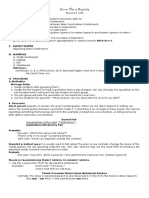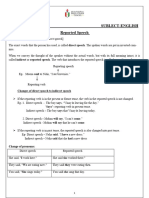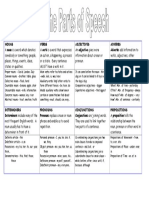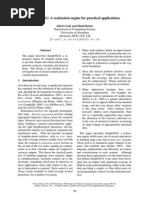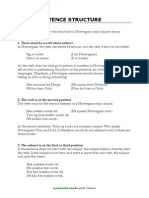Direct&Indirect Module
Uploaded by
Marielle VillagonzaloDirect&Indirect Module
Uploaded by
Marielle VillagonzaloObjective: Use direct and reported speech appropriately in varied contexts (EN7G-III-e-3)
What is Direct & Indirect Speech?
Direct Speech: the message of the speaker is conveyed or reported in his own actual words
without any change.
Indirect Speech: the message of the speaker is conveyed or reported in our own words.
General rule in changing direct speech to indirect speech:
Omit all inverted commas or quotation marks. End the sentence with a full stop.
If the verb inside the inverted commas/quotation marks is in the present tense, change it
into the corresponding past tense. If it is in the simple past tense, change it into the past
perfect tense.
The verb ‘am’ is changed to ‘was’. (Present Tense is changed to Past)
Example: Direct speech: The little boy said, “I want to go to the party.”
Indirect speech: The little boy said that he wants to go to the party.
Example: Direct speech: The girl said, ‘I like singing.’
Indirect speech: The girl said that she liked singing.
Example: Direct speech: Rahul said, ‘I will have to reach home by 8.30.’
Indirect speech: Rahul said that he would have to reach home by 8.30.
Example: Direct speech: Alina said, ‘I met James yesterday.’
Indirect speech: Alina said that she met James yesterday.
Example: Direct speech: The boy said, ‘I’m happy with my results.’
Indirect speech: The boy said that he was happy with his results.
Example: Direct speech: They said, "We have never been here before."
Indirect speech: They said that they had never been there before.
PRACTICE EXERCISE: Change the direct speech into reported speech.
1. June said, It is my car.”
a. June said that it is my car.
b. June said that it is her car.
c. June said that it was my car.
d. June said that was her car.
2. Jim said, “I work here every day.”
a. Jim said that her worked here yesterday.
b. Jim said that he worked here every day.
c. Jim said that he worked here every day.
d. Jim said that he worked everyday.
3. Nan said, “I have finished my homework.”
a. Nan said that she had finished her homework.
b. Nan said that she had finished my homework.
c. Nan said that she has finished her homework.
d. Nan said that she has finished my homework.
4. She said to me, “I can sleep alone.”
a. She said to me that she can sleep alone.
b. She told me that she can sleep alone.
c. She said to me that she could sleep alone.
d. She told me that she could sleep alone.
5. John said, "My friend may come tonight."
a. John said that his friend might come tonight.
b. John said that his friend might come that night.
c. John said that his friend might go that night.
d. John said that his friend might go tonight.
Activity 1. Analyze the given sentences. Change the direct speech to indirect/reported speech
and vice versa. Write your answer on the space provided.
1. She told her mother that she was going to the market.
2. His friends told me that they would go home the following Sunday.
3. The teacher told Mark he had been very regular in his work.
4. Marc told me that he had finished his work.
5. The teacher said the earth moves around the sun.
6. Crissa said, "I will do this for him."
7. Crispin’s wife reported, “Five men stole the horses.”
8. “I like to eat rice every morning, “Pare Crispin’s son said.
9. Mang Cesar said, “I brought five cavanes of rice.”
10. “I did not eat this morning,” the child stated.
Activity 2. Write five (5) example sentences for direct speech and indirect speech. Write it on
the back.
You might also like
- A DETAILED LESSON PLAN IN Direct and Indirect75% (4)A DETAILED LESSON PLAN IN Direct and Indirect10 pages
- A Detailed Lesson Plan in Direct and Indirect Speech88% (8)A Detailed Lesson Plan in Direct and Indirect Speech7 pages
- Conversational Isizulu - Module Guide - CIZ1437N100% (2)Conversational Isizulu - Module Guide - CIZ1437N24 pages
- Direct & Reported Speech: Grammar Practice WorksheetsNo ratings yetDirect & Reported Speech: Grammar Practice Worksheets15 pages
- PDF - English Grade 7 - Unit 18 - Direct and Reported Speech, 3 TopicsNo ratings yetPDF - English Grade 7 - Unit 18 - Direct and Reported Speech, 3 Topics24 pages
- English: Learner's Activity Sheet Assessment ChecklistNo ratings yetEnglish: Learner's Activity Sheet Assessment Checklist11 pages
- Q1 G7 Worksheet Direct and Reported SpeechNo ratings yetQ1 G7 Worksheet Direct and Reported Speech5 pages
- Module 5 Direct and Reported Speech FINALNo ratings yetModule 5 Direct and Reported Speech FINAL18 pages
- Direct and Indirect Speech With Detailed ExplanationNo ratings yetDirect and Indirect Speech With Detailed Explanation11 pages
- Detailed Lesson Plan in English 9 I. Objectives:: (The Teacher Lets The Students Write Their Sentence On The Board.)No ratings yetDetailed Lesson Plan in English 9 I. Objectives:: (The Teacher Lets The Students Write Their Sentence On The Board.)7 pages
- direct speech and indirect speech. abstract nounNo ratings yetdirect speech and indirect speech. abstract noun13 pages
- t 1726644919 Reported Speech Esl Lesson Teens b1 Ver 5 1No ratings yett 1726644919 Reported Speech Esl Lesson Teens b1 Ver 5 127 pages
- Into Duct Ion Direct and Indirect SpeechNo ratings yetInto Duct Ion Direct and Indirect Speech4 pages
- The International School - Agra: Homework Assignment For 4 January 2022No ratings yetThe International School - Agra: Homework Assignment For 4 January 20223 pages
- Changing sentences Direct into indirect speechNo ratings yetChanging sentences Direct into indirect speech8 pages
- G9+Lesson+2+Direct+and+Reported+Speech_compressedNo ratings yetG9+Lesson+2+Direct+and+Reported+Speech_compressed32 pages
- See It & Say It! Jumbo Workbook Edition | First Grade Sight WordsFrom EverandSee It & Say It! Jumbo Workbook Edition | First Grade Sight WordsNo ratings yet
- 100 Present Simple Sentences: 100 Present Simple Sentences Made Easy: Tense, #1From Everand100 Present Simple Sentences: 100 Present Simple Sentences Made Easy: Tense, #1No ratings yet
- Logical Connectors and Text Types Activity SheetsNo ratings yetLogical Connectors and Text Types Activity Sheets1 page
- Transcoding From Linear To Non Linear TextNo ratings yetTranscoding From Linear To Non Linear Text2 pages
- In Car Na Dine: In-Kahr-Nuh-Dahyn, - Din, - DeenNo ratings yetIn Car Na Dine: In-Kahr-Nuh-Dahyn, - Din, - Deen1 page
- Conjunctions and Interjections PP LessonNo ratings yetConjunctions and Interjections PP Lesson21 pages
- That Puppy's Knocking Over Those Potplants!: Phonetic Substance. This100% (3)That Puppy's Knocking Over Those Potplants!: Phonetic Substance. This2 pages
- Possessive Adjectives and Possessive Pronouns Grammar Drills Grammar Guides - 26942No ratings yetPossessive Adjectives and Possessive Pronouns Grammar Drills Grammar Guides - 269422 pages
- 02-04 - Adverbs and Adverb Phrases - Typical Errors - English Grammar Today - Cambridge DictionaryNo ratings yet02-04 - Adverbs and Adverb Phrases - Typical Errors - English Grammar Today - Cambridge Dictionary6 pages
- Draga Zec Prosodic Differences Among Function WordsNo ratings yetDraga Zec Prosodic Differences Among Function Words36 pages
- Buku Bahasa Inggris (Theresia) (P010311120120)No ratings yetBuku Bahasa Inggris (Theresia) (P010311120120)135 pages










